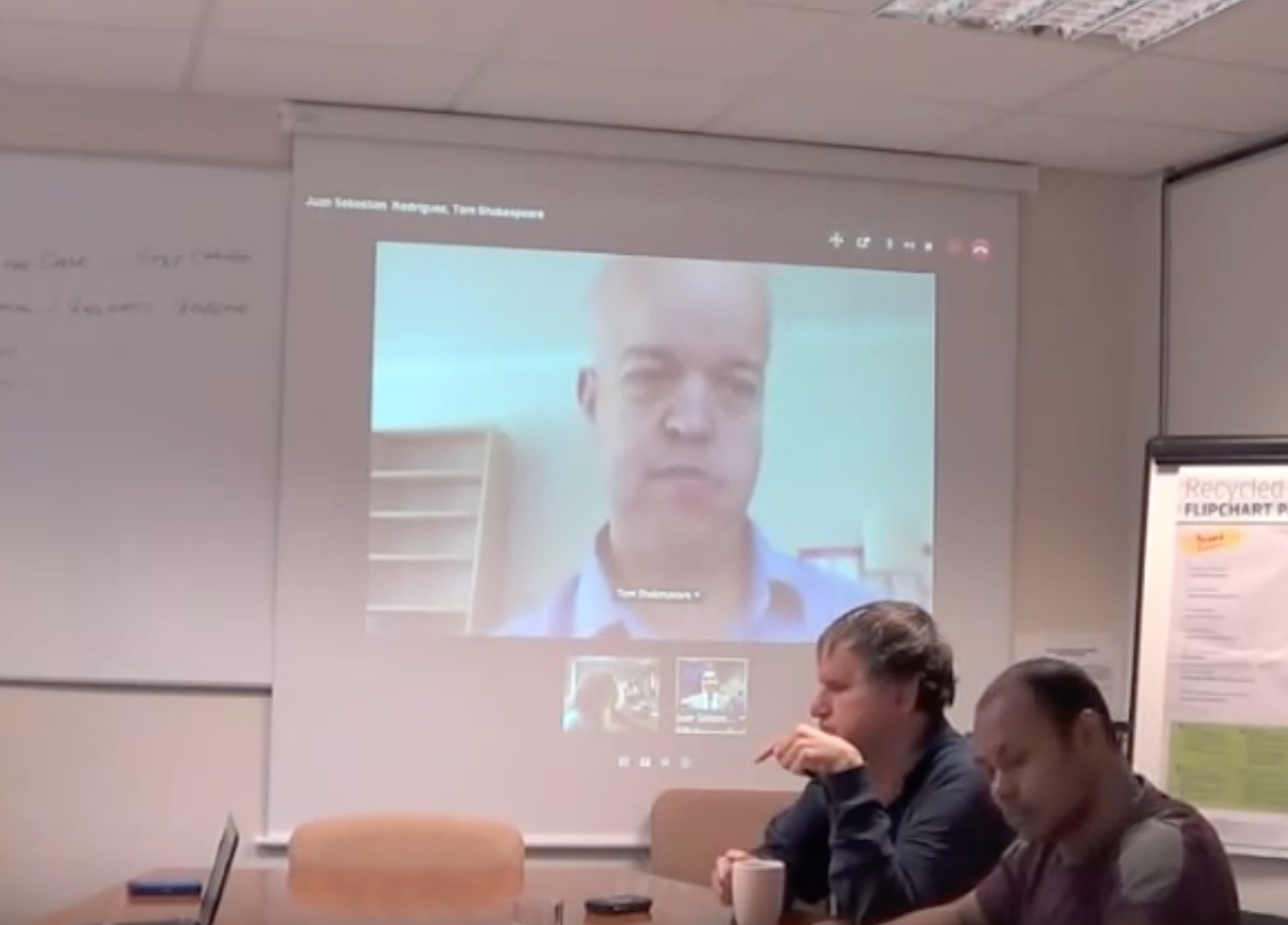Ha insegnato presso le Università di Sunderland, Leeds e Newcastle. Dal 2008 al 2013 ha lavorato per conto dell’Organizzazione Mondiale della Sanità alla realizzazione del Rapporto Mondiale sulla disabilità (2011). Attualmente insegna Sociologia magica presso la University of East Anglia. (da Centro Studi Erickson, in Disabilità e Società, Shakespeare T., 2014). Si propongono una bibliografia ed un video che affrontano il tema del Social Model Disability Studies.
The social model of disability: an outdated ideology? (2002)
Shakespeare T. and Watson N.
The Social Model of Disability (2010)
Shakespeare T.
in The Disability Studies Reader Ed , Davis L.J.
New York: Routledge (Pre-print copy)
Bibliography
Barnes, C. (1991). Disabled people in Britain and discrimination. London: Hurst and Co.
Bickenbach JE, Chatterji S, Badley EM, Ustun TB (1999) Models of disablement, universalism and the international classification of impairments, disabilities and handicapss, Social Science and Medicine 48, 1173-1187Butler, J (1990) Gender Trouble: feminism and the subversion of identity. New York, Routledge.
Bury, M. (1997) Health and Illness in a Changing Society, Routledge, London.
Butler, J (1990) Gender Trouble: feminism and the subversion of identity. New York, Routledge.
Campbell, J. and Oliver, M. (1996). Disability Politics: understanding our past, changing our future. London, Routledge.
Charlton J (1998) Nothing About Us Without Us: Disability, Oppression and Empowerment University of California Press, Berkeley
Crow, L (1992) ‘Renewing the Social Model of Disability’, Coalition, July: 5-9 French, S. (1993)
Dreidger D (1989) The Last Civil Rights Movement, Hurst, London.
Finkelstein, V (1981). To deny or not to deny disability. In Brechin, A. et al (Eds.).Handicap in a Social World. Sevenoaks, OUP/Hodder and Stoughton.
Finkelstein, V. (1998) Emancipating disability studies, in T.Shakespeare (ed) The Disability Reader: social science perspectives, Cassell, London.
French, S (1993) Disability, impairment or something in between, in John Swain et al (eds.) Disabling Barriers, Enabling Environments. London: Sage, 17-25
Gustavsson, A, Sandvin, J., Traustadóttir, R, Tossebrø, J (2005) Resistance, Reflection and Change: Nordic disability research, Studentlitteratur, Lund.
Hahn, H. (1988). The politics of physical differences: disability and discrimination.Journal of Social Issues, 44 (1) 39-47
Hasler, F. (1993) Developments in the disabled people’s movement. In J.Swain et al. (Eds.), Disabling barriers, enabling environments. London: Sage.
Oakley, A (1972) Sex, Gender and Society, Maurice Temple Smith, London.
Oliver, M. (1996) Understanding disability: from theory to practice. Basingstoke: Macmillan.
Oliver, M. (2004) The social model in action: if I had a hammer, in C.Barnes and G.Mercer (eds) Implementing the Social Model of Disability: theory and research, The Disability Press, Leeds
Morris, J. (1991) Pride Against Prejudice, Women’s Press, London.
Shakespeare, T. and Watson, N. (2001). The social model of disability: an outdated ideology? In Barnarrt, S. & Altman, B.M. (eds.). Exploring Theories and Expanding Methodologies: where are we and where do we need to go? Research in Social Science and Disability volume 2, Amsterdam: JAI.
Sherry, M. (2002) If only I had a brain, unpublished PhD dissertation, University of Queensland.
Shakespeare T. (eds)Disability/Postmodernity: embodying disability theory, Continuum: London, pp 32- 47.
Swain, J, Finkelstein, V., French, S. & Oliver, M. (Eds.) (1993) Disabling Barriers, Enabling Environments. London, OUP/Sage.
Thomas, C. (1999) Female Forms, Open University Press, Buckingham.
Thomas, C. (2004) Developing the social relational in the social model of disability: a theoretical agenda, in C.Barnes and G.Mercer (eds) Implementing the Social Model of Disability: theory and research, The Disability Press, Leeds
Tremain, S. (2002) On the subject of impairment, in M.Corker &
Union of the Physically Impaired Against Segregation (1974/5) Policy Statementwww.leeds.ac.uk/disability-studies/archiveuk/archframe.htm (consulted August 10, 2005)
Union of the Physically Impaired Against Segregation (1975) Fundamental Principles, www.leeds.ac.uk/disability-studies/archiveuk/archframe.htm (consulted August 10, 2005)
Watson, N. (2002) Well, I know this is going to sound very strange to you,but I don’t see myself as a disabled person: identity and disability, Disability and Society, 17, 5, pp 509-528
Williams, S.J. (1999) Is anybody there? Critical realism, chronic illness, and the disability debate, Sociology of Health and Illness, 21, 6, pp 797-819
Wolfensberger, W. (1972) The Principle of Normalization in Human Services, Toronto: National Institute on Mental Retardation.
Zola, I.K. (1989). Towards the necessary universalizing of a disability policy. The Milbank Quarterly, vol. 67, suppl.2, Pt. 2., 401-428
Intervento di Shakespeare

